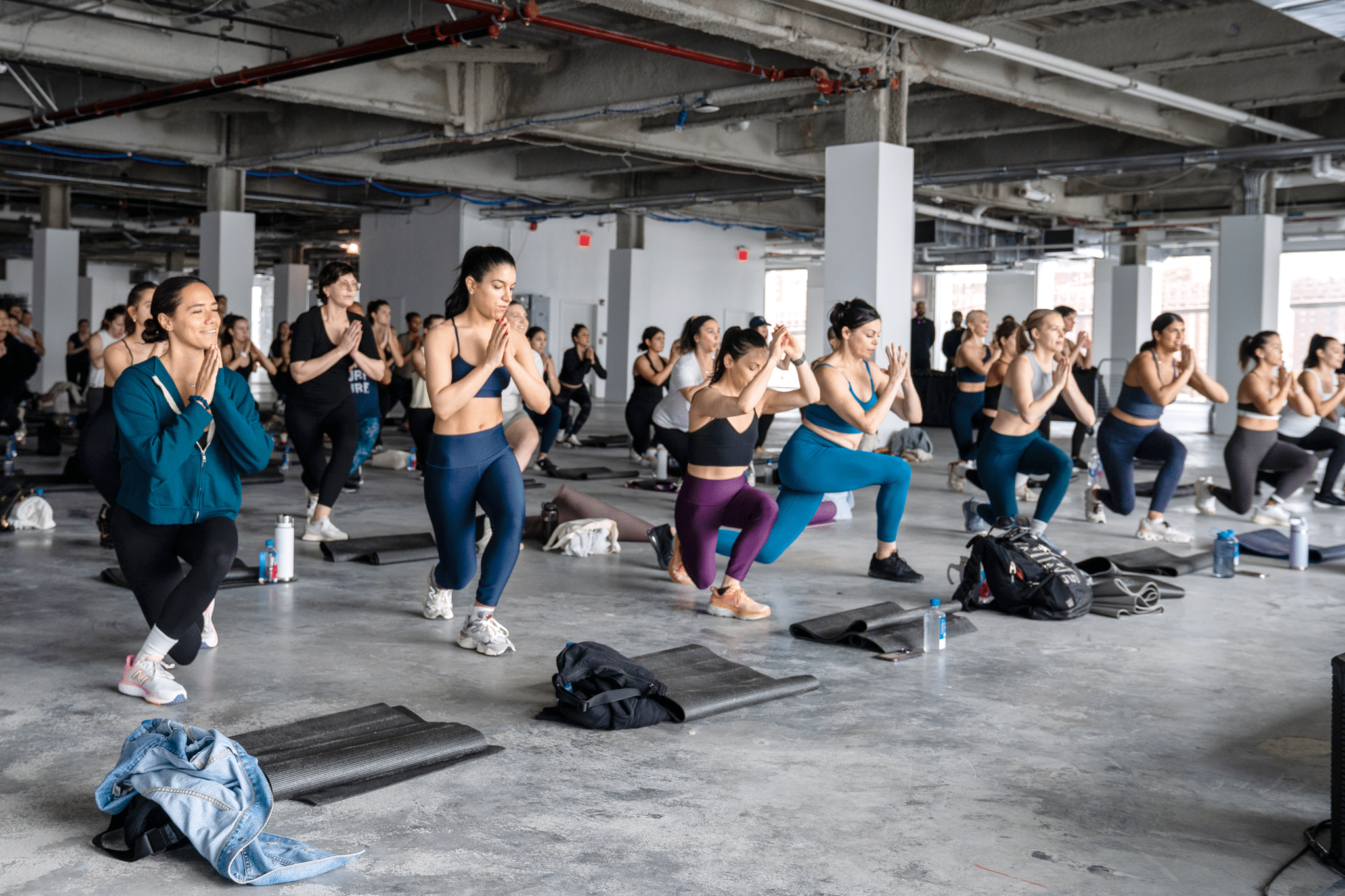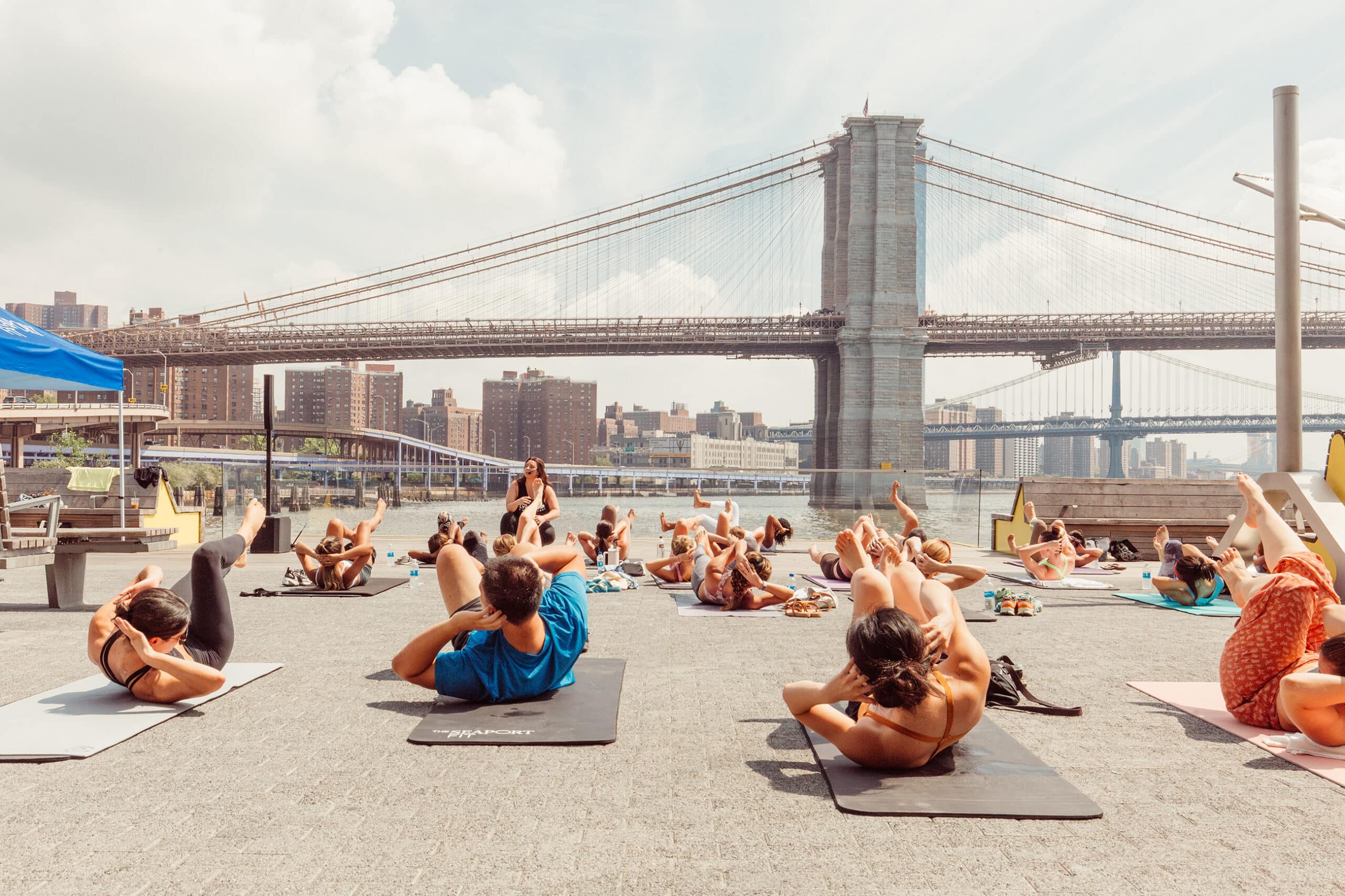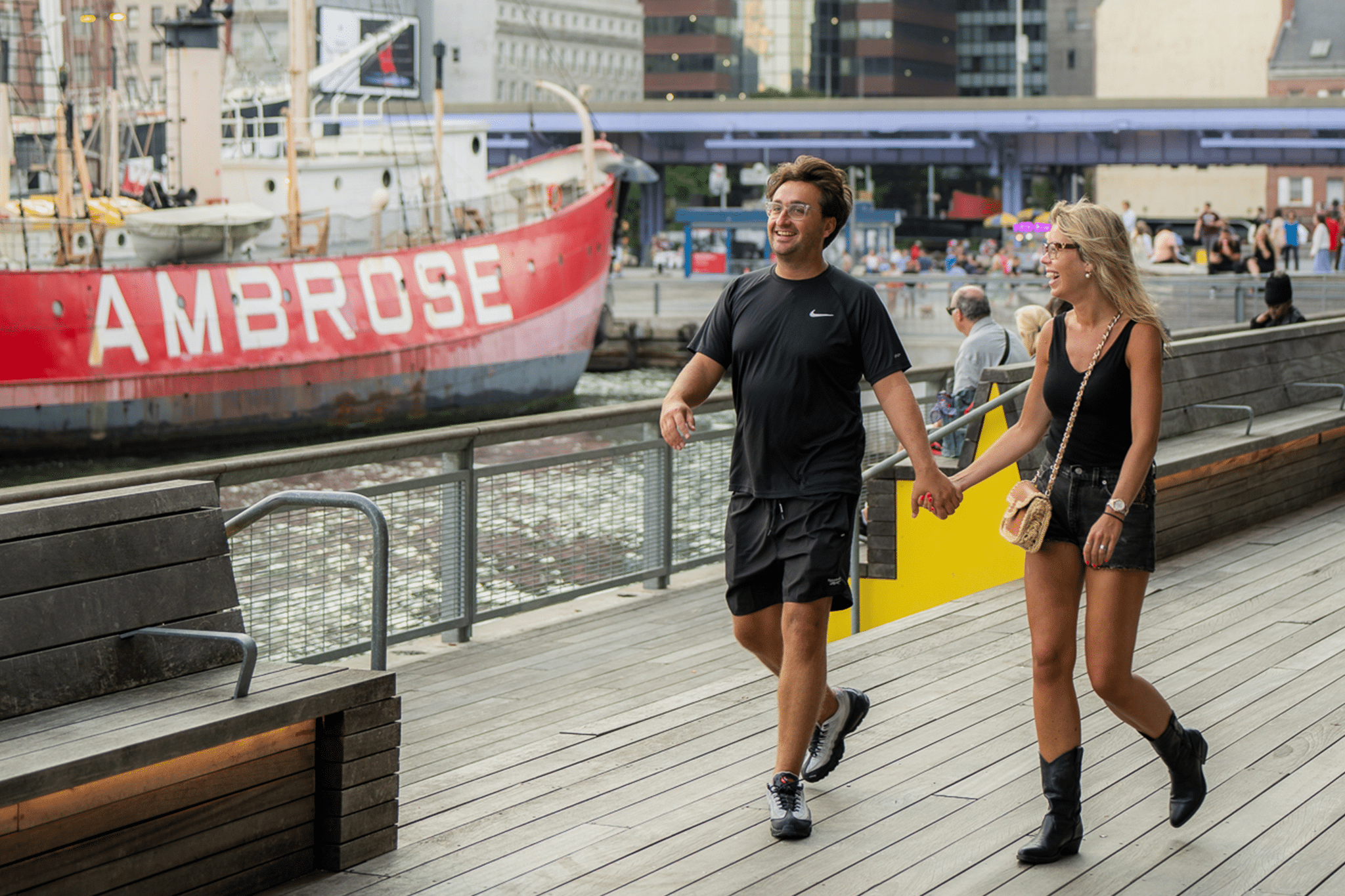
Wellness at the Seaport: How Lifestyle Habits Impact Mental Health
Sculpting your body. Calming your mind. These are easy enough to do in a workout class or a meditation session. But how do we take care of our wellness needs on a regular basis? The key is in integrating the concept of wellness into your daily routine.
At our Seaport Fit x Wellness on the Water Presented by NewYork-Presbyterian event on Saturday, May 18, members of our expert health panel discussed the everyday habits that can have an outsized impact on your mental health and well-being. In honor of Mental Health Awareness Month, we’re sharing highlights and actionable tips from the featured panelists.

Meet the Experts
Our panelists from NewYork-Presbyterian included (left to right in photo):
Gabrielle Gambino (Nutrition Expert): As a senior dietitian at NewYork-Presbyterian and Weill Cornell Medicine, Gabrielle provides nutrition guidance to patients and specializes in nutrition care for those hospitalized for advanced heart failure.
Dr. Erin K. Engle (Movement / Exercise Expert): A clinical psychologist at NewYork-Presbyterian and Columbia, Dr. Engle is trained in Mindfulness Based Stress Reduction and has interests in positive psychology, stress management, and integrative approaches to health and well-being.
Dr. Carl W. Bazil (Sleep Expert): Dr. Bazil is a neurologist at NewYork-Presbyterian and Columbia and is board-certified in neurology, epilepsy, clinical neurophysiology, and sleep medicine.
Hajra Jaffer (Moderator and Well-being Coach): A senior well-being coach at NewYork-Presbyterian, Hajra helps people achieve their optimal physical and emotional well-being. She is also a registered yoga teacher and nutrition instructor at Hunter College.
Wellness Tips for Your Everyday
Get Enough Zzz’s
Most people don’t realize what happens when you’re asleep, says sleep expert Dr. Bazil. One of the reasons sleep is so crucial for our mental health is that it’s actually doing some very important things, including clearing toxins and processing and consolidating memories for you. “If you don’t sleep properly, you won’t learn and you won’t process,” he explains. “It will affect your daytime function, and over time, we believe that sleep can help with your mental health and the prevention of further difficulties decades away.”
As for the million-dollar question—how much sleep is enough?—Dr. Bazil told the Wellness on the Water audience that, while everyone is different, a good range is 7-9 hours.
To help improve your chances of getting to and staying asleep, Dr. Bazil recommends finding a way to wind down, whether it’s a breathing technique, meditation, or watching a sitcom from 20 years ago that you’ve seen a hundred times.
“These are things that tell your brain, ‘Let’s pull away from all the busy-ness and stress of life. It’s safe for you to go to sleep now,’” he says. “We all know the rules, like don’t look at your phone. But occasionally someone will tell me, ‘If I scroll Facebook, it puts me right to sleep.’ That’s fine if it works for you, but the problem for most people is that the phone is a rabbit hole, and it keeps you awake.”
Whatever method works for you, Dr. Bazil insists that it’s important to allow enough time for your pre-bedtime unwinding process—and to try the same relaxation techniques to get back to sleep if you wake up in the middle of the night.
If insomnia becomes a problem, Dr. Bazil recommends seeking medical help. “The best approach is called cognitive behavioral therapy for insomnia,” he says. “[It involves] working with a sleep therapist to help teach your brain better sleep habits.”

Move More Regularly
Psychologist Dr. Engle reminds us that stress is natural, but when it gets intense, it can create anxiety and tension. The good news is that exercise or any type of movement can be an effective way to cope with stress. Dr. Engle’s top practical tip for managing day-to-day stress is to see where you can naturally fit movement into your day.
“That doesn’t have to look like something rigorous,” she says. “Research shows that if we spend even 30 minutes doing active exercise, we can increase blood flow to the brain, which then supports processes like clear thinking, having more energy, and just feeling good all around.” For those of us working from home or on a hybrid schedule, even small changes like fitting in movement between Zoom calls can help. “You could take your calls on a headset and get outside for 10 to 15 minutes,” Dr. Engle adds. Taking the kids or a pet to the park is a great way to bring play into the day, too.
Dr. Engle knows that exercise can feel daunting if it’s not already a part of your daily practice, but combining activity with fun and trying out something new can help. One easy way to test out a new exercise routine is to sign up for a free Seaport Fit Lyon’s Den yoga class this summer. These weekly sessions are held outdoors on the Heineken Riverdeck. You can reserve a spot in advance and then simply show up and give it a go.

Get Outside
There’s a reason why you feel better after you’ve spent time outside. “Unequivocally, being outdoors is good for our health,” Dr. Engle says. “There are science-based reasons for this. Vitamin D, for example, is energizing, it makes us feel good. We get that from sunlight.” The artificial light many of us sit under all day can increase stress levels. “By going outdoors, we’re able to experience nature in a more present and sensory-focused way.”
If breaks and outdoor workouts aren’t an option during your workday, Dr. Engle suggests squeezing in time outside in the morning in preparation for your day. For instance, prior to the Wellness on the Water panel at Pier 17, she spent time looking at the water, appreciating the blue space around the Riverdeck. “Positive emotions naturally come with appreciating natural beauty,” she adds.
Hajra, the moderator and well-being coach, also weighed in with positive habits that have helped her. “One of the things I’ve started doing, which has really helped me, is that when I go for a walk, I look for what’s new and what brings me joy,” she says. “For example, I love seeing the little flowers on Park Avenue. It’s crazy how such small things in New York City, this concrete jungle, can bring so much joy.”

Eat Well to Be Well
Another key topic discussed by the Wellness on the Water panel was the link between food and mental health. Gabrielle, the dietitian, explained that there is a direct connection between what you put in your gut and what happens in your brain.
“We hear about diets for your heart when you have heart disease. We hear about diets for your pancreas when you have diabetes. There are studies out now showing that there are diet changes you can make to impact your brain health,” she says. “Nutrition is a powerful tool.” When used in conjunction with things like medication, stress relief and lifestyle changes, diet can have a positive impact on many chronic diseases and conditions.
One example Gabrielle gave was the role of food in avoiding and treating inflammation. “Gut inflammation can impact your brain inflammation, and brain inflammation has been seen in conditions like Alzheimer’s and dementia. So it’s important to think about what you’re putting in your body. Focusing on anti-inflammatory foods may help avoid those kinds of health and cognitive conditions down the road.”
Dining out doesn’t have to upend your healthy eating habits. Look for clean, whole food-oriented dishes when eating out, and choose restaurants that offer these selections on their menus, like Malibu Farm and other Seaport options. If you prefer to cook at home, you can swing by Tin Building’s central market, where you’ll find a fresh selection of produce and healthy ingredients to form the foundations of a balanced diet.

Be Social
Another crucial element of our mental health is our social networks—the IRL ones. “It’s such an important human need to feel connected, to feel a part of a group,” says Dr. Engle. “When we’re socially connected, there’s a positive impact on stress reduction.” She points to those times when a call to a friend can make all the difference to our state of mind. “Speaking to someone we’re close with is shown to reduce our blood pressure. There’s a natural scientific benefit.”
Beyond the science, Dr. Engle also advocates for the closeness that comes from being understood by people close to us. “Vulnerability and authenticity, these are things that allow us to not only reflect on ourselves, but also deepen and strengthen our friendships and connections with others. It’s incredibly important—and lovely.”
As Hajra pointed out during the panel, loneliness is reportedly on the rise, so community-building and connecting plays a huge role in supporting our mental health.
“Any effort to get out, to be active, and to potentially share that with others stands to support good mental health, resiliency, and feeling less alone,” says Dr. Engle, underscoring the benefits of an event like Wellness on the Water and other community-focused events held at the Seaport throughout the year.
To close out the panel, Hajra offered a quote by Buddhist monk Thich Nhat Hanh, which she keeps on her door: “Smile, breathe, and go slowly.” In other words, she adds, “Enjoy the moments.”
